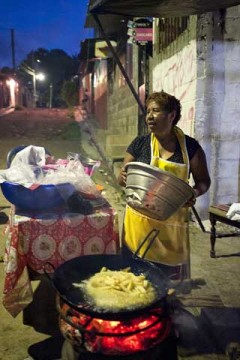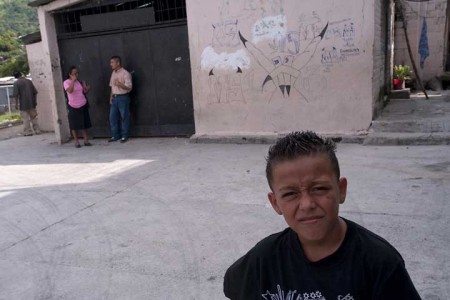Somewhere in the world a child dies of hunger every 5 seconds. 17,000 die every day, six million a year. These are the appalling statistics cited by UN Secretary-General Ban Ki-moon at the Global Climate Change summit in 2009.

Every afternoon Elena fries Yuca and potatoes on the street in passageway number three in Sierra Alta.
The World Bank’s most recent poverty estimates based upon statistics gathered up until 2005 reveal that in that year 1.4 billion people in the developing world (one in four people then living on earth) existed on less than US$1.25 a day.
Food, clothing, shelter, clean water as well as access to education and health care are essential for human subsistence. Absolute poverty refers to those whose survival is precarious due to lack of these basic needs. Relative poverty is an index of income inequality—it can refer to lower earning power and less access to resources compared with others in one’s own society or when compared with global averages. Both forms of poverty are barriers to human development.
Historically one of the chief obstacles to economic progress has been unwillingness by governments to engage in land reform. In Central America the consolidation of wealth and land in the hands of feudal elites was a major contributor both to crushing levels of poverty and to the conflicts that engulfed the region during the 1980s. Other impediments which continue to plague Central American nations in the post conflict era are corruption, weak rule of law, and the brain and labor drains provoked by outward migration resulting from in-country lack of opportunity.
While poverty may exist without violence, economic stress can trigger cycles of violence, which in turn exacerbate poverty. A US survey, in the 1990s published by Johns Hopkins University Press found that 67% of children from disadvantaged US urban communities had witnessed a serious assault, and 33% reported witnessing a homicide. War, political instability and crime, including violent gangs and drug cartels, not only discourage economic investment, but also create psychosocial barriers to economic development. And repeated traumas may have a cumulative impact upon emotional resilience.
Poverty is both stigmatized and criminalized. Neglect and social exclusion marginalize the poor. Prisons are built to contain them when they resort to informal economic survival strategies that are deemed illicit by those with other options. And yet the policies, which alleviate poverty, are not mysterious. The United Nations Development Program published a report in April 2000, which focused on good governance as a key to economic development. When corruption or the selfish interests of wealthy elites or an absence of non-repressive state institutions characterizes governance development stalls. Policies, which respect, support and harness community and individual resourcefulness to stimulate micro enterprise and provide for basic needs have demonstrated success in overcoming poverty.
